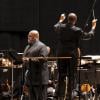
Heralded by the Los Angeles Times as a “singer of immense power and fervor,” bass-baritone Davóne Tines is redefining what the career of a classical singer can look like, blending genres, styles, and personal history in projects that confound categorization. All of that will be on view when the 37-year-old Tines performs “Open Process — Robeson: Unpacking a Classical Americana Electro-Gospel Acid Trip” on Sept. 27 at the Colburn School’s Zipper Hall.
Presented by Monday Evening Concerts — and coinciding with the recent Nonesuch release of Tines’s debut solo album, Robeson — the performance also involves curator Hamza Walker and Tines’s band, pianist John Bitoy and sound artist Khari Lucas (collectively known as The Truth). Exploring and exploding the musical repertoire of Paul Robeson, the pioneering singer, actor, and activist who died in 1976 at age 77, the recording, as well as the concert presentation, offers listeners the chance to journey from the stage of Carnegie Hall to the floor of a Moscow hotel room in order to understand an icon not through aspiring to his monumentality but through connecting to his vulnerability.

Tines, who made his Metropolitan Opera debut in John Adams’s El Niño last April, told SF Classical Voice: “As an opera singer, I’ve found that what I’ve been interested in … is how things are created and produced and [being] intentional in how I build performances. I want to share my values as somebody trying to make work that’s honest to my personal life but also has an eye toward the socially engaged world.
“There doesn’t have to be a wall between the artistic activity and the audience [or] the activity and the artists themselves,” added Tines, who co-created Robeson with director Zack Winokur. “I think [the idea of performance often] eschews the possibility of personal connection with audiences because we try to keep a facade. Whatever is happening in a performance is not always presented as an invitation for the audience to connect to it.”
To these ends, Tines will be singing well-known works during Friday’s concert while also segueing into new musical territory. Included on the program is “The House I Live In,” an updated version of a 1940s tune that Tines, after Robeson, turns into a call for racial and socioeconomic equality. Then there’s the ballad made famous by Robeson, “Ol’ Man River,” which in Tines’s interpretation is decidedly not your mother’s ballad. In addition to his deeply resonant, honeyed voice, the arrangement makes use of a synth track inspired by the Black queer Detroit-techno duo Drexciya.
Unique to the “Open Process” presentation, Tines will be in conversation with Walker to provide context, personal stories, and insight into how the music came to be. As for the show’s Hunter S. Thompson-style subtitle, referring to the fact that Robeson attempted suicide in a Moscow hotel room after allegedly being drugged with LSD by the CIA, it was Tines’s jumping-off point for the project.
“I think it was true that while he was in political exile, Robeson was poisoned by the CIA,” Tines said. “It is recorded in a biography from his son and also understood from other sources.”
It also helps explain what Tines is aiming for in Robeson: “What I try to do artistically is show that people can be multiple, they can be all the facets of themselves at one time. We’re all not just one thing. We all don’t just express ourselves in one vein. I wanted to demonstrate how true that can be.
“I have a classically trained voice,” Tines continued, “but that has allowed me to move in many different directions while having my full voice be central. I knew that I wanted this project to contend with Paul Robeson as an ancestor, as I see him — a Black low-voiced male who did incredible things beyond his singing. He’s the example of what a singer can actually be, a possible ideal, and I mean that in the way of a singer who uses their platform to be explicit about their personal expressions.”
If this sounds heady, that’s OK with Tines. “The whole point with the album [is] it’s always shape-shifting,” he said. “Sometimes I’m more like [Robeson]. Sometimes I’m more like myself. There are different things — spiritual, gospel, Bach, funk. With an album, there’s the incredible benefit of intimacy and the benefit of using the tools of a recording studio as an extension of your voice.
“I think people sometimes think that engaging with technology can kill or obscure the artistry,” added Tines, “and I’m saying I chose to use the technology for how it can expand my artistic expression. And for that reason, I used a pop-music audio engineer — and I worked with producers and mixers who come from the popular-music world — because I wanted to bring this material and the story of Paul Robeson to a contemporary ear.”
Not surprisingly, the live concert will also feature miking and electronics. “If I’m singing without a mic but with an instrument that is electronic, those instruments don’t get to interact in a harmonious way with the audience,” Tines pointed out. “You have to allow everything the equal opportunity to be heard. Also, it’s not just about ‘Can you hear it or not?’ but ‘Can you hear the specificity in the details?’ There are ways I’m able to use my classical training, [but] I simply cannot do it unamplified.”
Tines ultimately stressed that “the audience can have listened to the album or read the liner notes but can also come as a blank canvass and enter the music of this project through what simply unfolds onstage.”




